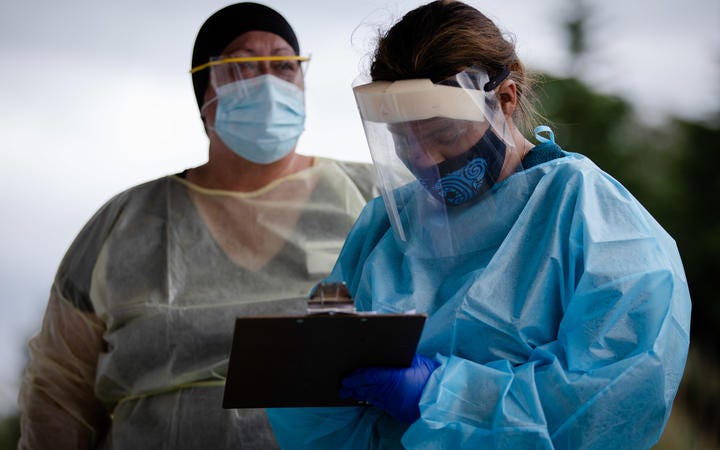Preparing for omicron
Border quarantine is filling with cases and supermarkets are stockpiling goods as the government readies a plan to face the new variant
Mōrena and welcome to The Bulletin for Thursday, January 20, by Justin Giovannetti. Presented in partnership with Z Energy.
In today’s edition: Tonga’s government unveils damage; police to resume aerial hunt for cannabis; plans to abolish the Children’s Commissioner; but first, how New Zealand will respond to an omicron outbreak.
The omicron variant will challenge New Zealand’s covid approach. (Angus Dreaver/RNZ)
Two months after omicron was first detected in South Africa, cabinet is finalising a plan to respond. New Zealand’s supermarkets and industries have not waited for direction from the top, with RNZ reporting that stockpiling is underway after crisis planning across the country’s businesses. Evidence from overseas has shown that omicron, one of the most transmissible viruses ever detected, can still infect people who are double-vaccinated and can evade cloth masks. That’s played havoc on entire economies with workers forced into isolation. In response, the US government cut its isolation period to five days for the infected. New Zealand businesses need only look to Australia, where ABC has reported bare shelves at Countdown and other stores as workers and truck drivers have had to stay home due to surging infection rates.
Not sure about omicron? Stuff’s Keith Lynch has written an explainer about the variant. One helpful reminder: While the vaccines are less effective at preventing symptomatic infection, they hold up very well at stopping serious illness.
The prime minister started the week getting a booster shot, the country’s Covid-19 approach is likely to get a booster today. Cabinet met yesterday at the Labour caucus retreat and omicron was on the agenda. Armed with new advice from the ministry of health, Jacinda Ardern and Covid-19 minister Chris Hipkins have promised changes to the country’s pandemic strategy. As the NZ Herald writes about the meeting, the traffic light system is likely to undergo some tweaks. Asked yesterday if any part of New Zealand will enter the green light setting, Hipkins hesitated before saying he’d need to discuss the system with cabinet. The hesitation spoke volumes about a system that is as old as omicron itself. Ardern has warned that community spread of the variant will mean a national move to red. That community spread is expected soon.
A health document leaked to Māori television highlights some of the challenges facing the country. As the broadcaster reports, the document shows that the government is worried about panicked buying of food, masks and medication when omicron arrives. Only one-third of the country’s ICU beds are currently available, according to the report, and the lack of previous infection in New Zealand could mean that a local wave of omicron could be worse than that in Europe and the US. The cornerstone of New Zealand’s response so far has been to cut the interval for booster shots. Along with possible changes to the traffic light system, I’ll be keeping an eye today on whether the government announces stricter mask rules, a reinforced testing programme and a proposal to protect the country’s health system when the variant arrives.
Border facilities are still tasked with trying to keep omicron out. More cases have been detected in MIQ over the past 21 days than within New Zealand itself, a sign of the unprecedented number of travellers carrying omicron on arrival. That’s despite pre-departure tests being required before getting on a plane to New Zealand. Speaking to media yesterday, Hipkins said the border system is under too much strain and new bookings have been put on pause. As Stuff reports, a planned reopening of the border next month hasn’t been cancelled yet. New Zealanders overseas have challenged the move and a judicial review of the entire MIQ system has been put off to February, according to RNZ. Epidemiologists have backed the decision to pinch off the border, calling it a necessary sacrifice as people queue for booster shots.
2021 will be remembered for the spread of delta, creating one of the most challenging stories—and commercial environments—in recent memory. It made us rely even more heavily on the support of our members. If you love what we do, please consider donating today. Want another way to support us? Invite your friends and whānau to subscribe to The Bulletin and keep them across Aotearoa’s biggest stories.
Tonga’s government calls eruption ‘unprecedented disaster’. In his first public statement since Saturday’s disaster, Tonga’s prime minister said a 15-metre tsunami has destroyed two outlying islands and confirmed three deaths, according to The Guardian. New Zealand is considering sending repatriation flights to Tonga to help people impacted by the volcano, One News reports. The country’s main airport could be back into operation today after ash is cleared from its runway. For a better sense of the scale of the disaster, Reuters has created a series of graphics putting the eruption in context.
Police to resume aerial search for cannabis, one year after operation cancelled. Despite an edict from police headquarters only last year that putting planes and helicopters in the air to hunt for cannabis plants wasn’t a good use of resources, police are back at it, Stuff reports. Police won’t identify which areas of the country the searches are resuming. Critics of the operation contend that police will likely see medical plants from the air. It’s unclear how much it’ll cost this year, but the aerial search previously had an annual price tag of about $700,000.
In a story that came out during the summer break, the government is looking to scrap the role of Children’s Commissioner. As part of planned changes to Oranga Tamariki, the government has proposed replacing the advocacy role with a less powerful board. As Luke Fitzmaurice writes in The Spinoff, the current commissioner has been essential to providing oversight of Oranga Tamariki and advocating for children. The new board seems designed to advocate less and focus on gathering evidence, while losing all powers to investigate wrongdoing.
Researchers want to use Auckland’s fibre broadband network to detect earthquakes. By firing laser pulses repeatedly down fibre cables, researchers say they can detect even the weakest earthquakes, BusinessDesk reports. Very weak earthquakes, those below magnitude one, aren’t detected by GeoNet. Monitoring the Earth’s tremors could help keep tabs on the Auckland volcanic field. Knowing what’s normal and abnormal, a picture of normal background movement, would be a way of keeping tabs on what’s happening below the country’s largest city.
Unvaccinated South Cantabrians want rebates on their council rates. The Canadian province of Quebec is imposing a punitive tax on the unvaccinated, because they’ll cost the health system more. The Timaru Herald reports that unvaccinated locals there think they should pay less, because they can’t use council facilities without a vaccine pass. Over 30 requests have been made to Timaru council. One woman said that she’s upset she can’t go to the art gallery or library with her children anymore, all they can do now is meet with other unvaccinated families in parks. “We are living in a parallel world,” she said.
Got some feedback about The Bulletin, or anything in the news?
Get in touch with me at thebulletin@thespinoff.co.nz
Right now on The Spinoff: Madeleine Chapman looks at tips about how you can save for a house deposit. Duncan Greive concludes that however the Tova O’Brien case is decided, Three has lost. Naomii Seah reports on a call from retail for more support around enforcing mask use. Josie Adams discovers the appeal of mundane games that offer the escapism of lawn mowing and house cleaning. Chris Schulz writes a plea to streaming services to offer the show Hacks.
Black Caps tour of Australia cancelled over border shutdown. The cricket team won’t be travelling across the Tasman as planned on Monday over fears they wouldn’t be able to return following the government’s border closure. Stuff reports that New Zealand Cricket is optimistic it’ll be able to plan a tour in March, assuming that the government’s promise of quarantine-free travel holds. The sports body says it wants a trans-Tasman bubble, which seems unlikely after Australia reported 175,271 omicron cases in a single day last week.
That's it for The Bulletin. If you want to support the work we do at The Spinoff, please check out our membership programme.







If it is not NZ'ers coming home, who are the people that are filling MIQ facilities?